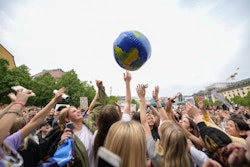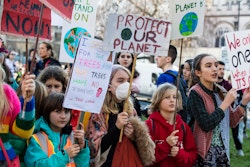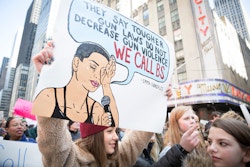#31DaysOfYOUth: the new generation on all fronts
This year, the UN International Youth Day focuses on the Youth Engagement for Global Action and highlights all the ways youth actions and activism is moving the world closer to the Sustainable Development Goals.

Friday for Future in Stockholm, Sweden
In a world struck by climate change and the pandemic, and where international conflicts are only getting more acute, the future of the young generations has been jeopardized. As they step into adulthood, they must face climate catastrophes, job insecurity, global health crisis and a widening gap between social-economical classes.
Raising the voice to save the future
The current global situation takes a tool on mental health, as a recent study by the Washington Post suggests. The emotions that most teenagers report feeling in regard to their future is fear, followed by outraged and, finally, motivation. The rejection of society’s norms has led children, teenagers and young adults to take to the street, to demand change on a local and a global scale. Some, like Greta Thunberg or Jamie Margolin, are raising their voice against climate change, organising strikes and marches from their classrooms or their childhood bedrooms. Others are mobilizing for racial justice, gender equality, gun control, education and LGBTQ rights.
“There’s no guaranteed tomorrow, and I haven’t lived.”
Being a teenage, going to school, keeping up with homework and exams, and leading nation-wide marches is no easy job. Most of these young activists report working from home until late and getting very little sleep. This requires a lot of commitment, especially when you believe, deep down, that you might not have a future. As Greta Thunberg, the activist at the root of the school strikes for climate, famously said “Why should any young person be made to study for a future when no one is doing enough to save that future?”. It is in the outrage that young people find the motivation to engage and unite against leaders that failed them.

Climate march in central London - 2019
An international reputation
Some of these young faces have now gained international reputation.
Malala Yousafzai (23)
is a Pakistani activist that started fighting, at the age of 11, for the education of girls under Taliban occupation. Her outspoken spirit did not please the Taliban and she was shot in the head in 2012. She survived the attack and became an international figure for the right to education. In 2014, she was the co-recipient of the Nobel Peace Prize, thus becoming the youngest-ever Nobel Prize laureate at age 17.
Emma Gonzalez (20)
and her classmates were at the centre of a massive youth movement for gun control. In 2018, she survived a school shooting where 17 teenagers died, which led her and other survivors to create the Never Again advocacy group. She is known for her powerful speeches against gun violence, calling “B.S.” on the lobbyism of the NRA (National Rifle Association) and the lack of action from politicians.

Portrait of Emma Gonzalez - New-York, 2018
Marley Diaz (15)
started at the age of 11, when she got sick of reading books “About white boys and dogs”. This young feminist launched a campaign called 100 Black Girl Books in 2015, raising over 9 000 books featuring black female protagonists. These books have been redistributed to schoolchildren in Jamaica, and her movement has called awareness on the lack of diversity in children’s literature.
Ella Briggs (12)
has been making waves among the young LGBTQ+ community, creating a strong platform to promote LGBTQ+ youth safety. Her work focuses on training teachers and educators on LGBTQ+ issues, as well as providing a safe environment for a gender-diverse youth. “Coming out shouldn’t be that hard” she insists, some very young teenagers become homeless after speaking out their true identity, and Ella wants to create a world where love and inclusion dominate over fear and hate.
Nupol Kiazolu (18)
is the President of the Youth Coalition for Black Lives Matter in New York. She also founded the Vote 2000 campaign. Her commitment to the racial equality began when she was only 13 years-old, after the murder of Trayvon Martin by a neighbourhood watchman. She came to school the next day wearing a black hoodie with the phrase “Do I look suspicious?” painted on the back. Her leadership in the Black Live Matter movement earned her a spot on the Vogue’s 21 under 21, a list of 21 influential persons under 21 years old.
“Realizing the promise of the generation means investing far more in young people’s inclusion, participation, organizations and initiatives.”
No age limit for social change
Young activists face endless obstacles on having their voice heard, especially from dismissive adults. Critics argue that these young people do not have original ideas and are manipulated by politicians. Or that they are over-reacting, being hysterical or have extreme demands. After Greta Thunberg was nominated as Time magazine’s person of the year (2019) for her message of climate urgency, President Trump tweeted:
So ridiculous. Greta must work on her Anger Management problem, then go to a good old fashioned movie with a friend! Chill Greta, Chill!
Teenagers would like nothing more than to chill at the movies with friends, unfortunately, the uncertainty of their future prevents them from enjoying their youth. We, as a society, need to support these young activists world-wide, to allow them to reach the fullest of their great potential.
It is time to listen and to work with the youth generations to create a future they want to live in.
